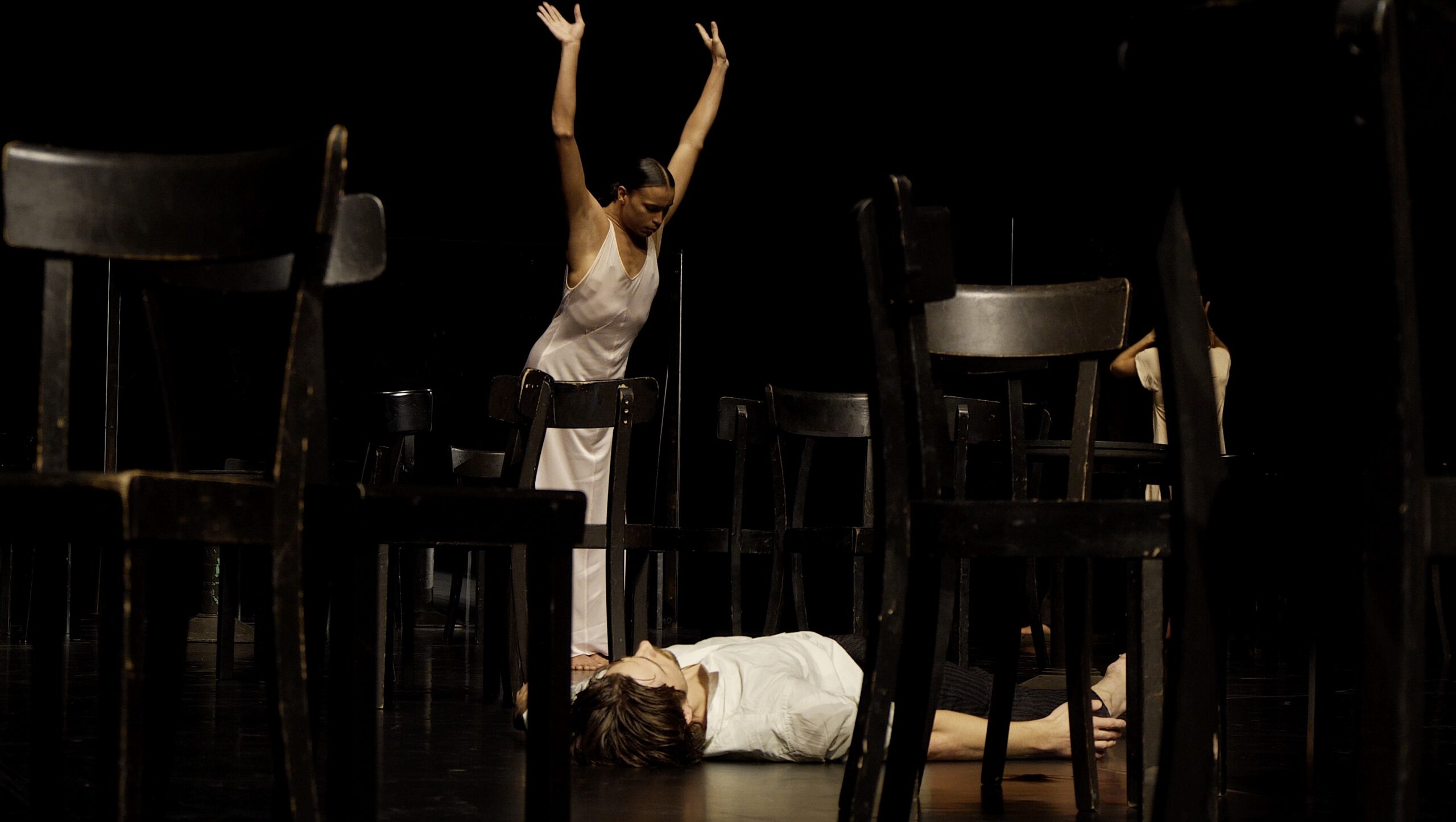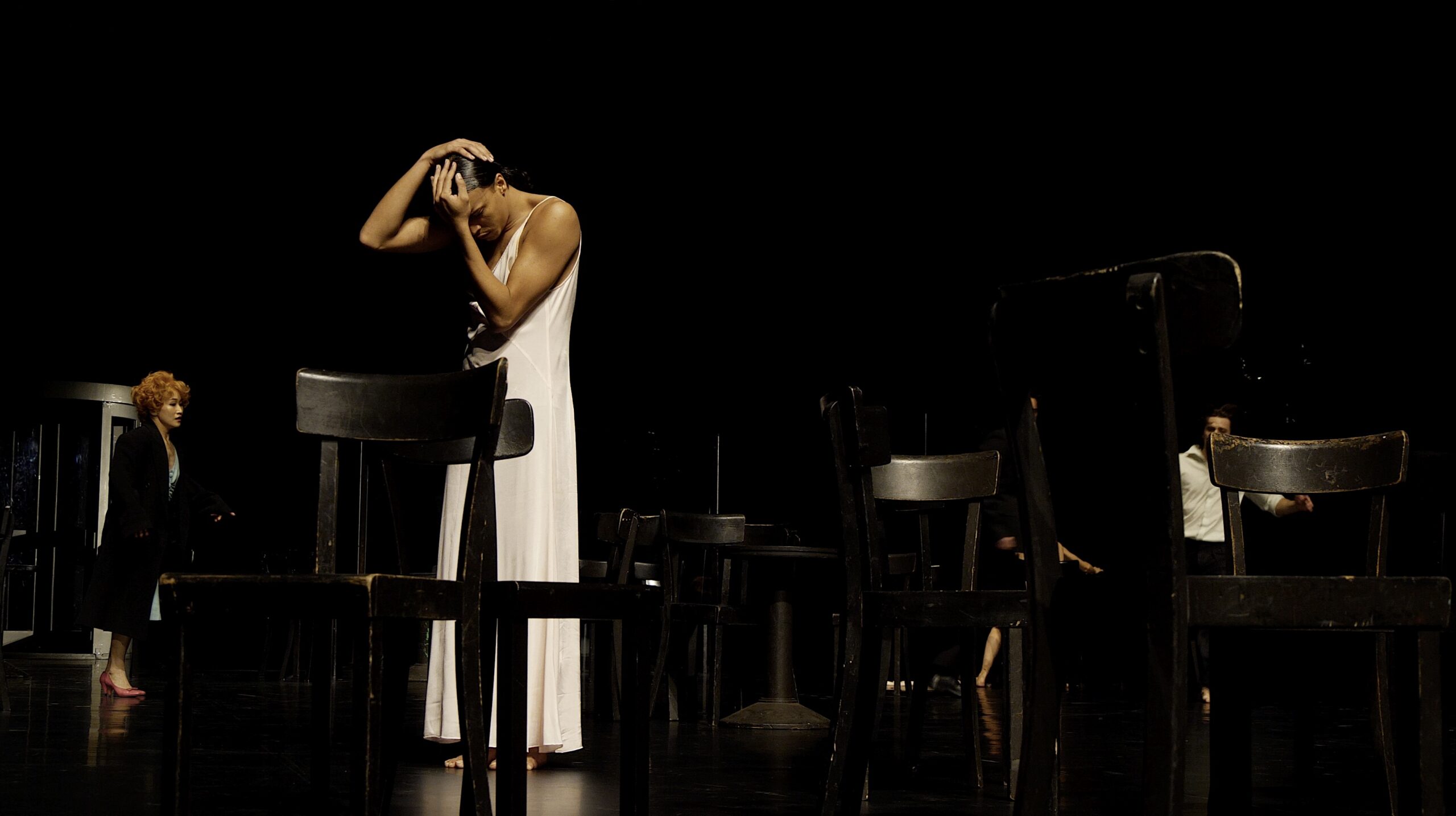Our video impressions
What remains…
… from „Café Müller“ as part of the Club Amour evening by Boris Charmatz
by Klaus Dilger
Melanie Suchy reviewed the evening for us and comes to the questioning conclusion: „Maybe it’s time to close the café“. Therefore, in addition to the aspect of our own impressions for the audience through our video impressions, a few thoughts on the visible development of Tanztheater Wuppertal:
Every performer brings a new colour to a piece and this is a good thing, but not every new coat of facade paint suits every building. Dance art lives from the architecture, the echo chamber, the resonance, the complexity, the execution, realisation, interpretation, timing and skill of the protagonists, who bring their works to life again and again, and it acquires meaning and gravitas through the interplay of all levels, space, light, sound and much more. This even applies to the mastery of choreography and staging of dance theatre pieces, as Pina Bausch demonstrated in the vast majority of her pieces. This interplay on stage (and wherever it is performed) may always seem like a small miracle, but it is based on a great deal of work, coupled with skill and the structures that bring about this „miracle“.
Some artists have decreed that their works should no longer be performed after their death, sometimes because they themselves can no longer intervene responsibly in the above-mentioned qualities.
For a long time, it seemed as if it was an absolute stroke of luck that the co-creators of Pina Bausch’s works in Wuppertal took the reins after the choreographer’s death and were able to revitalise the works again and again and pass them on successfully and carefully to subsequent generations.
Why does this no longer seem to work?
Is it because the new artistic director, the Frenchman Boris Charmatz, finds this passing on „too slow, too difficult, too German“ („c’est trop lente, trop lourde, c’est à l’allemand“), as he said on a discussion panel in Montpellier? (We reported HERE). Do such comments leave traces in the rehearsal management or even in the structural conditions of the rehearsal? In the case of „Café Müller“, is it because the artistic director seems to be of the quite obviously mistaken opinion that everyone in the company can and should dance this signature piece, even several times in succession in event mode (Look as much as you can…)?
When has the qualitative pain threshold been reached for Salomon Bausch?
The heir and rights administrator of the Bausch works, which were transferred to the publicly funded Pina Bausch Foundation, was rightly very open and positive about experiments on the occasion of „40 years of Café Müller“, but also emphasised the criterion of quality, which is of great importance to him and the foundation. During her lifetime, Pina Bausch was extremely selective when it came to passing on her works to other companies. For good reason, as more than a few examples show, in which such a transfer took place after her death. The most recent production of „Le Sacre du Printemps“ with the Berlin State Ballet, on the other hand, was praiseworthy, as it had suitable performers at its disposal, outstanding dancers who were also able to dance works by Naharin, Goecke and Sharon Eyal. It’s just a shame that the new Berlin artistic director, Christian Spuck, sacked most of them when he took office and as a result the piece can no longer be danced, despite its 92-strong ensemble, due to a lack of suitable performers. – This, too, illustrates the importance of the performers‘ skills, their daily training and conditioning, not only in the old Berlin, but also in the new, for which some advertising copywriters want to spend the city on the Wupper.
Royalties for performance rights
Of course, the Foundation also has other interests than disseminating the work of the dance theatre icon, as its work and the archive require funds that are always a tremble when they come from the public purse alone. The Berlin example is likely to represent a loss for the Pina Bausch Foundation, as it is not just about the valuable production, but also royalties for the performance rights to the piece.
The granting of performance rights to other companies seems to have increased recently. Of course, this may also be due to the age of the protagonists of the first hours, also with regard to the passing on of the rights to and by younger ensemble members, who should perhaps be kept in Wuppertal for as long as possible.
The royalties issue naturally also plays a role for Boris Charmatz when he transports two of his old pieces from the nineties to the love club (Club Amour) and sends them on tour (presumably also for all his other pieces) under the Tanztheater Wuppertal label.
„Sacre“ was sacrificed…
For what, apart from the royalties and Charmatz’s attempt to put his pieces on a par with those of Pina Bausch? For a supposedly exciting experiment to contrast the double bill with „Das Frühlingsopfer“, which has been practised for years, with another echo chamber? In our critic’s opinion (and that of other leading dance critics), this experiment clearly didn’t work. But perhaps the Tanztheater Wuppertal, see the example of the Staatsballett Berlin, would no longer be able to dance the demanding piece at the required high level in terms of personnel? And on the 50th anniversary of the ensemble in Wuppertal?
Sparse applause…
from the premiere audience, measured against the Wuppertal standard
To be more precise: it was the scantiest applause this reviewer has ever experienced for a dance theatre performance in Wuppertal in the last 35 years. And rightly so, even if it should not be concealed that the routine standing ovations were by no means always deserved.
„… It is an attempt: to give the dancers of Tanztheater Wuppertal, who have not yet interpreted these pieces, the opportunity to deal with the brittle subtlety of Café Müller and the unbridled radicalism of Aatt enen tionon and to present this duo from the piece herses (une lente introduction) with bodies intertwined in perfect union. It should be a lively evening: Purcell meets PJ Harvey, the timeless costumes of Café Müller contrast with the nudity of Aattt enen tionon, the three pieces will set the Tanztheater Wuppertal 2024 in motion!“ promised Boris Charmatz in his announcement in March 2023
„Maybe it’s time to close the café?“…
…our critic asked. The key has been placed in the hands of Boris Charmatz as the new artistic director by the politicians and the selection committee. Not for two years, nor for five years, as is usually the case for such positions, but for eight years. – That’s a lot of time – perhaps for the „WUNDER of WupperTAL“?












